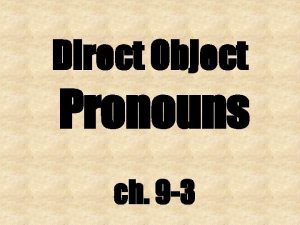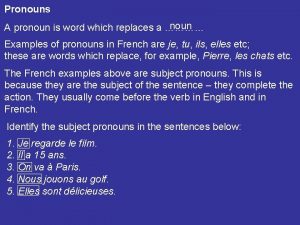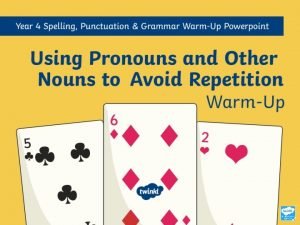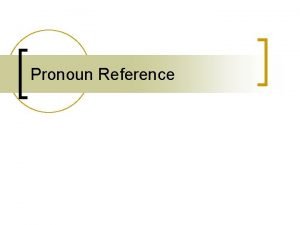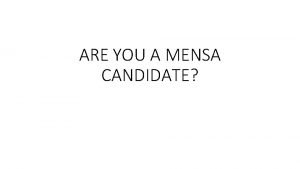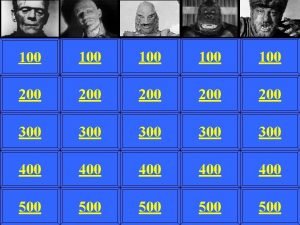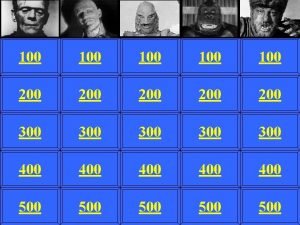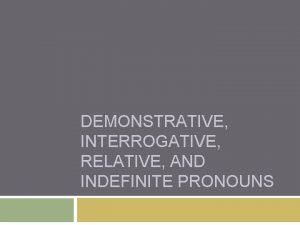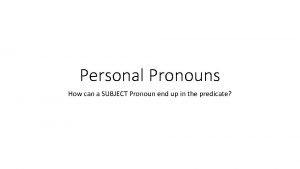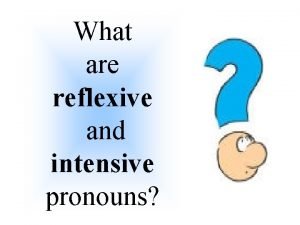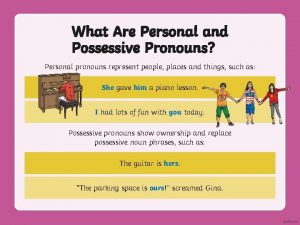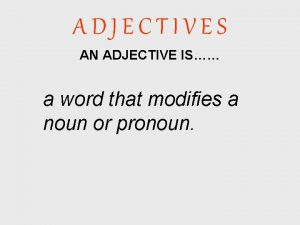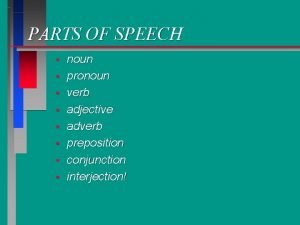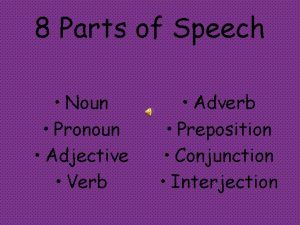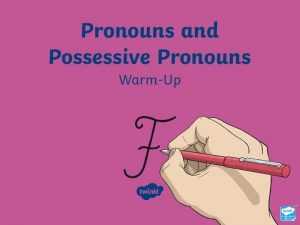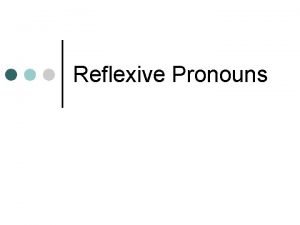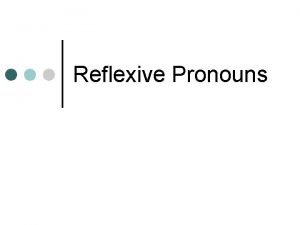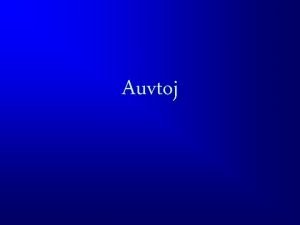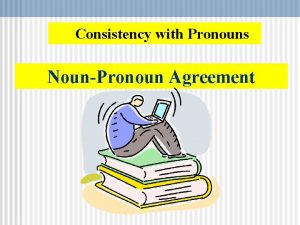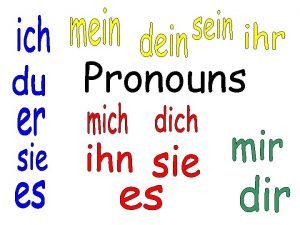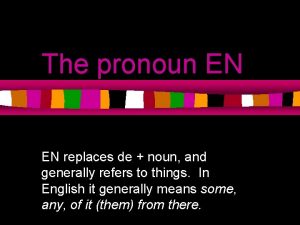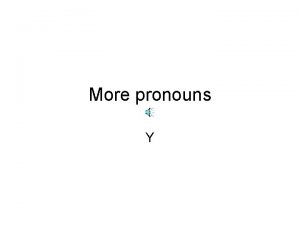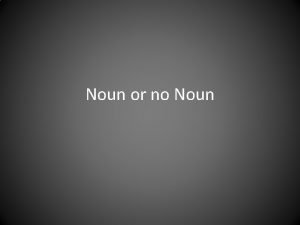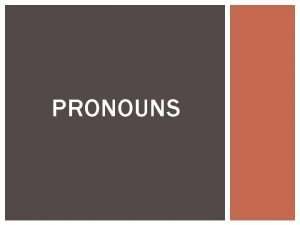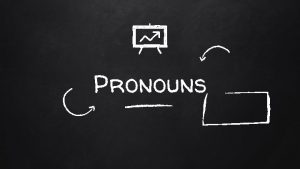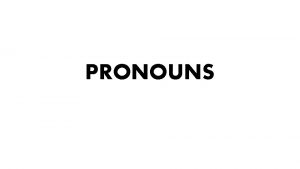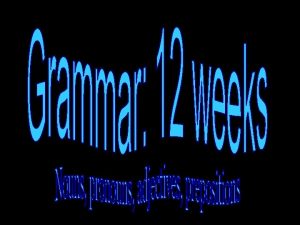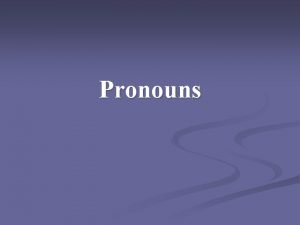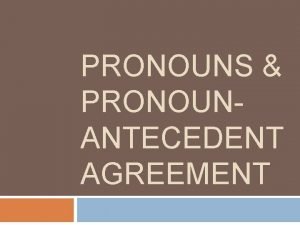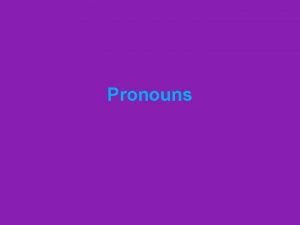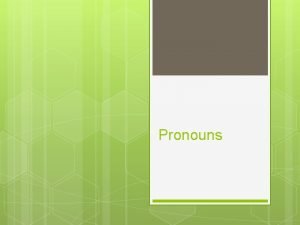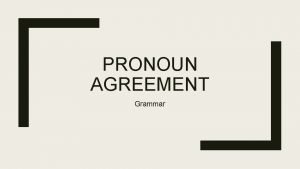Pronouns P 1 A pronoun replaces a noun


























- Slides: 26

Pronouns P 1

A pronoun replaces a noun in a sentence. The noun it replaces is called the antecedent. e. g. After I picked up my check, I gave it to my husband.

Antecedent P 2

The noun that a pronoun replaces or refers to. e. g. Harry went to church, but he didn’t stay for coffee.

Pronoun Cases P 3

There are three personal pronoun cases. Nominative – the subject of a sentence 2. Objective – the object of the verb or preposition 3. Possessive – a possessive pronoun 1. I Nom. gave him my Obj. Poss. book.

Personal Pronouns P 4

Take the place of a noun in a sentence. Nominative (as a subject) Objective (after the verb or in a phrase) Possessive (shows possession) First Person I Me My, Mine Second Person You Your, Yours Third Person He, She, It Him, Her, It His, Hers, Its First Person We Us Our, Ours Second Person You Your, Yours Third Person They Them Their, Theirs Singular Plural

Indefinite Pronouns P 5

Indefinite pronouns have no specific antecedent. They refer to people or things understood by the reader or listener. Indefinite Pronouns one something some another all anyone anything somebody each several someone everything everybody each other few everyone nothing nobody one another both no one many anybody other either none most any others neither

Reflexive and Intensive Pronouns P 6

Formed by adding -self to singular pronoun and -selves to a plural pronoun. myself yourself herself ourselves yourselves themselves himself itself

Demonstrative Pronouns P 7

Point out persons and things. this these that those

Three Confusing Pronouns P 8

Which do I really mean? Possessive Pronoun Contraction (not pronouns) Its It’s = it is Your You’re = you are Their They’re = they are

Pronoun Gender P 9

There are three genders: Masculine Feminine Neutral Nominative he she it Objective him her it Possessive his her, hers its

Interrogative Pronouns P 10

Introduce a question. Whom Whose refer to person(s) What refer to things, places, or ideas Which can refer to people or things

Relative Pronouns P 11

Relative pronouns introduce clauses in sentences. Whom Whose refer to people Which What refer to things That refers to things or people

Point of View ( Writing in First, Second or Third Person) P 12

Point of view refers to who is “speaking” in the writing. There are three “points of view. ” When you write, stay in one “point of view. ” Singular Plural First person I, me, my, mine we, us, ours It’s all about me. Second person you, your, yours It’s all about you. Third person he, she, it, him, her, its, this they, them, theirs It’s all about her.

Possessive Pronouns and Apostrophes P 13

Possessive pronouns don’t use apostrophes. your their its her his my our Don’t mix these up with other words that sound the same but are spelled differently like: your you’re its it’s these are contractions their they’re 28
 Direct object pronouns (p. 138) answers
Direct object pronouns (p. 138) answers Which direct object pronoun replaces the backpack?
Which direct object pronoun replaces the backpack? A word that replaces a noun
A word that replaces a noun Pronouns to avoid repetition
Pronouns to avoid repetition Direct object pronouns spanish
Direct object pronouns spanish Collective noun beginning with b
Collective noun beginning with b Which of the following replaces the question mark
Which of the following replaces the question mark A transposition cipher reorders symbols in a
A transposition cipher reorders symbols in a A good that replaces another demanded good
A good that replaces another demanded good Things fall apart symbols
Things fall apart symbols A good that replaces another demanded good
A good that replaces another demanded good Demonstrative interrogative and relative pronouns
Demonstrative interrogative and relative pronouns Meaning of objective pronoun
Meaning of objective pronoun Relative pronouns and interrogative pronouns
Relative pronouns and interrogative pronouns Predicate pronoun example
Predicate pronoun example Pronouns
Pronouns Pronouns personal and possessive
Pronouns personal and possessive What modifies adjectives
What modifies adjectives An adjective modifies:
An adjective modifies: Noun pronoun verb adverb
Noun pronoun verb adverb Noun pronoun adjective verb
Noun pronoun adjective verb Possessive adjectives atividades 6 ano
Possessive adjectives atividades 6 ano Demonstrative pronouns are
Demonstrative pronouns are Reciprocal and reflexive pronouns
Reciprocal and reflexive pronouns Personal pronouns and possessive pronouns
Personal pronouns and possessive pronouns Reflexive pronouns function
Reflexive pronouns function Functions of reflexive pronouns
Functions of reflexive pronouns

